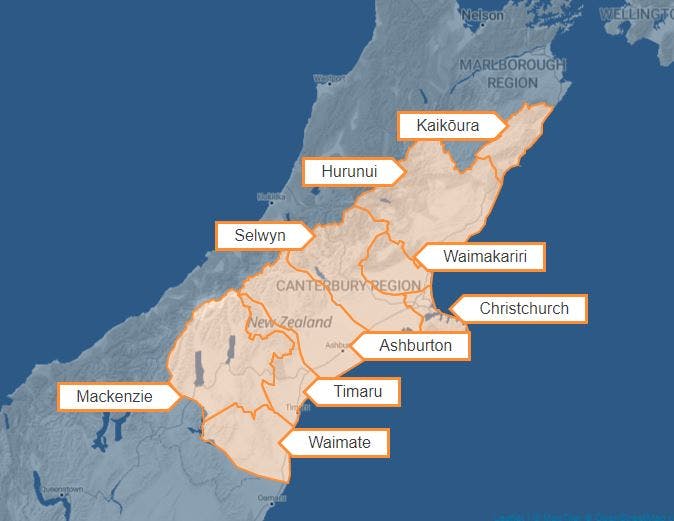After some unforeseen delays, including the Canterbury CDEM Group supporting many of our peer CDEM Groups in the North Island through February and March, we are now pleased to publish the updated version of the Group Plan. This can be found on the sidebar to the right.
The Canterbury Civil Defence Emergency Management (CDEM) Group Plan is the primary public document that outlines how Canterbury agencies reduce risk, get ready for, respond to, and recover from major emergencies and disasters in Canterbury. The current Group Plan was agreed to and published in 2014, and it received a minor update in 2018 to better reflect strategic planning for recovery.
Since 2014, Canterbury has experienced, responded to, and we continue to recover from, a wide range of significant events. The insured losses alone from these events are over $2.6 billion dollars, and the impacts have been felt across all communities and sectors in Canterbury. The larger recent events include:
-
Earthquakes – the Hurunui-Kaikōura 7.8Mw earthquake in November 2016, which ruptured over 20 faults, and has been described as the “most complex earthquake ever studied”
-
Wildfires – the Port Hills fire (2017)
-
Severe weather – including floods (2017, 2019, 2021); the Timaru hailstorm (2019); and two back-to-back Canterbury windstorms over 5 days in September 2021
-
Terrorism – the Christchurch shootings in March 2019
-
Pandemic – the ongoing COVID-19 global pandemic
-
Tsunami – numerous tsunami warnings and threats, most recently the complex 5 March 2021 response to 3 Kermadec trench earthquakes (7.3Mw, 7.4Mw and 8.1Mw) over six hours
We have also had many "smaller" events that have required alerting the public, working with communities, and coordinating response activities.
Canterbury continues to support other regions’ events including the Edgecumbe flood (2017), Pigeon Valley fire (2019), Southland floods (2020), Lake Ōhau fire (2020), Napier floods (2020), multiple severe weather events on the West Coast, and the Marlborough floods (2021).
Following the Kaikōura earthquake in 2016 and the Port Hills fire in 2017, an independent review of New Zealand's response to disasters was undertaken. This was released in early 2018, and the Government responded to the review in August 2018 with a significant range of actions to improve New Zealand's emergency management system.
In 2019, a new National Emergency Management Agency was formed to lead the improvement and changes to New Zealand's emergency management system. There are more key changes coming in the next 12 months:
- A new Act that will replace the Civil Defence Emergency Management Act 2002 and amendments.
- A new National Plan and Guide that will replace the existing Plan and Guide from 2015.
- A new delivery roadmap for the National Disaster Resilience Strategy.
There are other system reforms taking place that will impact on how we manage risk, and undertake emergency management. These include:
-
Resource Management System Reform – this covers the management of natural hazards, the built environment, and managed retreat from hazards
-
Three Waters Reform Programme – critical infrastructure operated by local authorities including drinking water, wastewater, and stormwater networks
-
The Future for Local Government review – the resilience, sustainability, and confidence of local government, and
-
Climate change – the completion of climate change risk assessments, and the development of action plans.
Collectively these reforms represent significant changes in how we operate, and will require us to develop a new Group Plan. We are already planning to start a new Group Plan in the second half of 2023, once the new Emergency Management Act is enacted.
We will delay reviewing these until the new legislation has been implemented:
-
Strategy - we are not updating our strategies and objectives at this time. We will start developing a new strategy later this year that will give full effect to the National Disaster Resilience Strategy, and how we expect to deliver it in Canterbury. Our new strategy, when completed, will drive us through to 2030.
-
Risk profiles - we are not updating the Risk Profile section at this time. In parallel with this update, we have started a project to update the risk profiles using the latest guidance from the National Emergency Management Agency. We have noted some of the key changes in our tsunami and earthquake risk.
-
Māori, Iwi and Te Tiriti - the system reforms are going to change the way we engage and partner with Māori to provide co-governance for emergency management. We are waiting on a new direction and guidance from the new Act that will define Māori partnership with emergency management. Once this direction has been set nationally, we will be starting new discussions with Māori and iwi as to how we work together in Waitaha Canterbury.
-
Disproportionately impacted communities - the updated legislation and arrangements are expected to create a greater focus on those communities that are disproportionately impacted by disasters.
-
Climate change - while we are aware of the impacts of climate change on our hazards, and we are already seeing an increase in tempo and consequences of weather events, we are holding off fully reflecting climate change in the Group Plan until its full rewrite in 2023.


